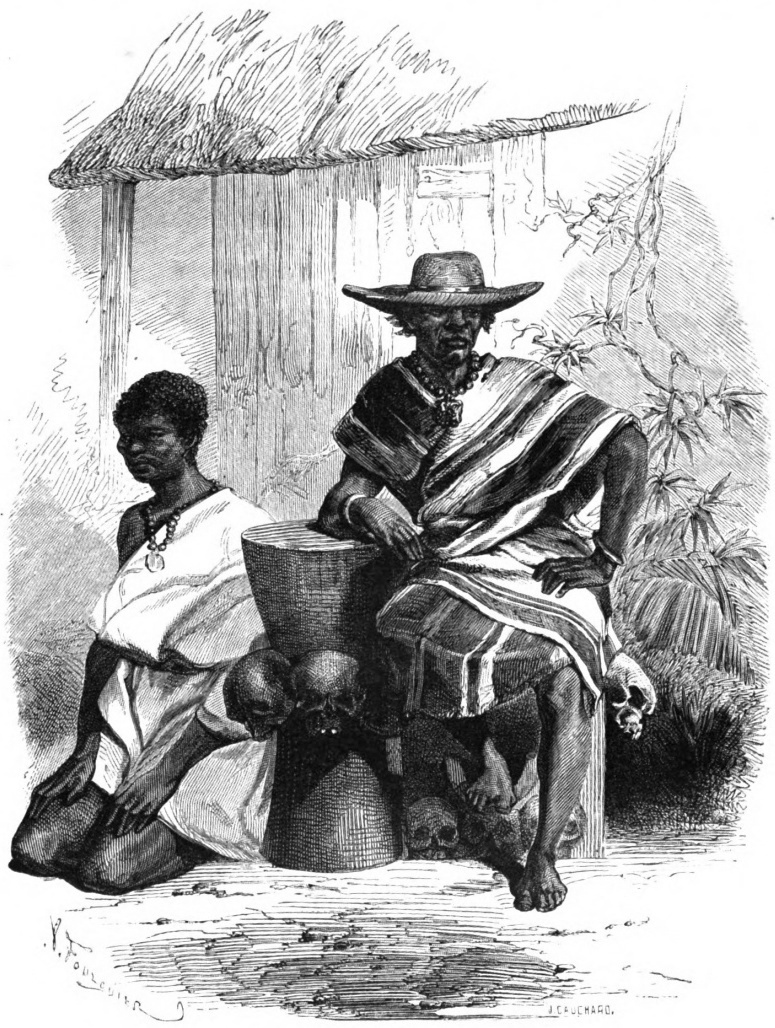Glele on:
[Wikipedia]
[Google]
[Amazon]
 Glele, or Badohou (died December 29, 1889), was the tenth
Glele, or Badohou (died December 29, 1889), was the tenth
 Glele, or Badohou (died December 29, 1889), was the tenth
Glele, or Badohou (died December 29, 1889), was the tenth King of Dahomey
The King of Dahomey (''Ahosu'' in the Fon language) was the ruler of Dahomey, an African kingdom in the southern part of present-day Benin, which lasted from 1600 until 1900 when the French Third Republic abolished the political authority of the ...
, ruling from 1858 until his suicide in 1889.
Life
Badohou, who took the throne name Glele, is considered (if Adandozan is not counted) to be the tenth King of the Aja kingdom of Dahomey (part of modern-dayBenin
Benin ( , ; french: Bénin , ff, Benen), officially the Republic of Benin (french: République du Bénin), and formerly Dahomey, is a country in West Africa. It is bordered by Togo to the west, Nigeria to the east, Burkina Faso to the nort ...
). He succeeded his father, Ghezo, and ruled from 1858 to 1889.
Glele continued his father's successful war campaigns, in part to avenge his father's death, in part to capture slaves. During his rule he sustained Dahomey's renaissance as a center of palm oil sales and slave trade. Glele also signed treaties with the French, who had previously acquired a concession in Porto-Novo
Porto-Novo (Portuguese: "New Port", , ; yo, Àjàṣẹ́, ), also known as Hogbonu and Ajashe, is the capital of Benin. The commune covers an area of and as of 2002 had a population of 223,552 people.
Situated on an inlet of the Gulf of G ...
from its king. The French were successful in negotiating with Glele and receiving a grant for a customs and commerce
Commerce is the large-scale organized system of activities, functions, procedures and institutions directly and indirectly related to the exchange (buying and selling) of goods and services among two or more parties within local, regional, nation ...
concession in Cotonou during his reign. Glele resisted British diplomatic overtures, however, distrusting their manners and noting that they were much more activist in their opposition to the slave trade
Slavery and enslavement are both the state and the condition of being a slave—someone forbidden to quit one's service for an enslaver, and who is treated by the enslaver as property. Slavery typically involves slaves being made to perf ...
: though revolutionary France itself had outlawed slavery
Slavery and enslavement are both the state and the condition of being a slave—someone forbidden to quit one's service for an enslaver, and who is treated by the enslaver as property. Slavery typically involves slaves being made to perf ...
at the end of the 18th century it allowed the trade to continue elsewhere; Britain outlawed slavery in the United Kingdom and in its overseas possessions in 1833, and had its navy make raids against slavers along the West Africa
West Africa or Western Africa is the westernmost region of Africa. The United Nations defines Western Africa as the 16 countries of Benin, Burkina Faso, Cape Verde, The Gambia, Ghana, Guinea, Guinea-Bissau, Ivory Coast, Liberia, Mali, M ...
n coast starting in 1840.
Glele's symbols are the lion and the ritual knife of the adepts of Gu ( Vodou of fire, iron, war, and cutting edges). His favorite wife was Visesegan.
Glele, despite the formal end of the slave trade and its interdiction by the Europeans, and New World
The term ''New World'' is often used to mean the majority of Earth's Western Hemisphere, specifically the Americas."America." ''The Oxford Companion to the English Language'' (). McArthur, Tom, ed., 1992. New York: Oxford University Press, p. ...
powers, continued slavery as a domestic institution: his fields were primarily cared for by slaves, and slaves became a major source of 'messengers to the ancestors' (sacrificial
Sacrifice is the offering of material possessions or the lives of animals or humans to a deity as an act of propitiation or worship. Evidence of ritual animal sacrifice has been seen at least since ancient Hebrews and Greeks, and possibly ex ...
victims) in ceremonies. In 1860, he met with William Foster, captain of the '' Clotilda'', the final ship to (illegally) take slaves to the United States, presumably to approve the sale.
Near the end of Glele's reign, relations with France deteriorated due to Cotonou's growing commercial influence and differences of interpretation between Dahomey and France over the extent and terms of the Cotonou concession grant. Glele died suddenly just before the French arrived for negotiations, possibly by suicide. Glele's son Prince Kondo handled negotiations with the French.
Glele died on December 29, 1889, to be succeeded by his son Kondo, who took the name Béhanzin
Béhanzin ( – 10 December 1906) is considered the eleventh (if Adandozan is not counted) King of Dahomey, modern-day Republic of Benin. Upon taking the throne, he changed his name from Kondo.
Biography
He succeeded his father, Glele, and ...
.
References
{{Monarchs of Dahomey Kings of Dahomey Year of birth unknown 1889 deaths 19th-century monarchs in Africa 19th century in the Kingdom of Dahomey